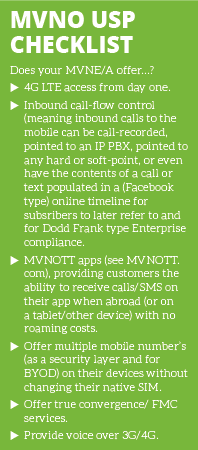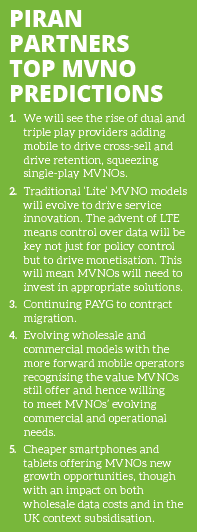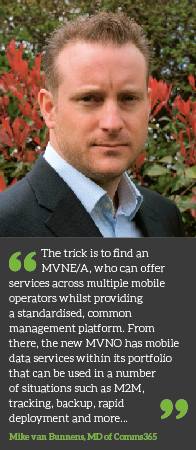
The MVNO market has never been as competitive as it is now.Differentiating your MVNO offering is not only difficult but sometimes a thank-less task if all your customer is interested in is price. David Dungay went into the Channel to take a look at the current landscape to try and find out the secrets to successfully operating an MVNO in 2015.
The MVNO market has always been a tough market to succeed in and in 2015 that rings true more than ever. Me too offerings are all too common in the market and can often topple in the face of industry challenges. On current Challenges in the market Simon Woodhead, MD of Simwood, commented “The answer to this question depends on the depth of MVNO under consideration. For brand-led light MVNOs the issues are around adding sufficient value to justify the penal economics, as competing on price with the main MNOs is by definition impossible. For heavier, infrastructure led MVNOs, such as Simwood Mobile, regulatory protection is the biggest challenge. Unlike non-mobile resources, obtaining necessary mobile resources from Ofcom is excruciatingly and unequally difficult.”
Mike van Bunnens, MD of Comms365 added “With a vast array of MVNOs already active within the market, the challenge is based around differentiation, service, simplicity and sustainability. With so much competition, new entrants without a key proposition that appeals to its target audience will, undoubtedly fail. Add to that the increasing cost of marketing and advertising the services and unique brand building and it is no wonder that behind so many successful MVNO brands are a smaller number of larger players.”

Jacques Bonifay, CEO of Transatel says “As an MVNO, there are two essential challenges. The first one is straightforward enough: establishing the right terms of negotiation with MNOs and striking the best possible deal for both parties. A key success factor in our market is buying power and the performance of procurement. Telecom minutes, SMS or MB, that were bought at too high a price simply won’t be competitive once they are re-packaged and presented to end-buyers.
The second challenge reflects Transatel’s position since its inception: developing and sustaining a true marketing edge, i.e. based on the marketing mix, not simply on the price factor. History has shown that founding one’s competitive advantage exclusively on aggressive prices is not sustainable in the long term.”
 On the regulatory side, the challenges are of a different nature. Bonifay continued, “We have entered a new cycle, marked by a series of consolidations that today pose a threat to a healthy level of competition in the market. Unfortunately, the legal remedies currently practiced to counter dominant positions may be efficient in the short term, but do not work in the long term, taking into account the nature of the industry. In short, the challenge regulators face is striking the right balance between achieving a market status that ensures an edge in the international competition, and stimulating local MVNO activity.”
On the regulatory side, the challenges are of a different nature. Bonifay continued, “We have entered a new cycle, marked by a series of consolidations that today pose a threat to a healthy level of competition in the market. Unfortunately, the legal remedies currently practiced to counter dominant positions may be efficient in the short term, but do not work in the long term, taking into account the nature of the industry. In short, the challenge regulators face is striking the right balance between achieving a market status that ensures an edge in the international competition, and stimulating local MVNO activity.”
Staying Ahead
If you are looking at starting your journey in the MVNO world then there are some key points you should take note of. Mike van Bunnens says “The simple answer is to differentiate and find that special something that connects you to your customers, although it’s not always that simple in reality. Many MVNOs today are concerned with Voice services, thus making this market extremely crowded and given the already dumbfounding array of tariffs and terms, hasn’t this space become more white-noise than white-label?
Data, on the other hand, presents an interesting opportunity for the Channel and Light MVNOs in particular. The trick is to find an MVNE/A, who can offer services across multiple mobile operators whilst providing a standardised, common management platform. From there, the new MVNO has mobile data services within its portfolio that can be used in a number of situations such as M2M, tracking, backup, rapid deployment and more and this new portfolio can take the MVNO into areas that were most likely never considered.”
Shanks Kulam, CMO of X-Mobility, agrees data is key, he said “With data usage on an ever increasing positive growth, we’re likely to see additional applications layered on to take advantage of the likes of 4G LTE. These could inc OTT app’s that provide functions such as WebRTC/Video calling, along with multiple Virtual SIMs (from different countries) being made available to the subscriber as different identities, hence enabling them to have a global presence.”
Not another “me too”
Differentiation isn’t exactly a lightning bolt concept these days yet it still separates the long term winners from the short term chancers. Simon Woodhead and Gavin Sweet both believe integration is key to success.
Woodhead commented “Our Simwood Mobile proposition is completely unique in that it enables a prospective MVNO to get up and running with full branding and call control for a trivial cost. Our MVNOs are therefore able to compete through adding technical value such as true convergence, e.g. PBX-mobile integration, mobile call recording, conferencing, and all manner of private mobile network type solutions. The “me too” vanilla mobile service billed by a middle-man will struggle I expect.”
 Gavin Sweet, Director at Skyrack Telecom added “The real opportunities for resellers and CPs in B2B markets in terms of additional revenues are not simply in being another mobile bundle “me too” player, or another re-branded SIM card player. Though this can clearly be effective for some channels, the operators themselves will always have a better deal and users may end up just “SIM surfing” your proposition like any other … you want to differentiate a little, add services to standout.
Gavin Sweet, Director at Skyrack Telecom added “The real opportunities for resellers and CPs in B2B markets in terms of additional revenues are not simply in being another mobile bundle “me too” player, or another re-branded SIM card player. Though this can clearly be effective for some channels, the operators themselves will always have a better deal and users may end up just “SIM surfing” your proposition like any other … you want to differentiate a little, add services to standout.
We believe that being able to add specialised, integrated mobile services that deliver “proper FMC” are where the opportunities lie. This means being able to bring to the mobile things like PBX services, call recording, common billing etc – importantly, via the SIM which is a far more easy and reliable method compared to soft clients with their inherent technical and user experience complexities. These enterprise class business features can all be delivered now, including full international roaming and porting capabilities.“

Trending
As we look to the future of the MVNO market there are several trends which are creating opportunities for the sector. Erick O’Connor, Director at Piran Partners says “Enterprises are now beginning to invest in dedicated mobile phones for their employees despite the advent of Bring Your Own Devices (BYOD). Security concerns and the need to control company sensitive information means that for IT managers there is value in controlling your own devices.
Prompted by these security concerns, FMC and the unified communications upsurge, businesses are increasingly seeking providers who can provide a complete single source service at a lower cost. For the channel this can mean exploring existing partner agreements and supply-chain relationships, and diversifying to unlock new revenue streams.”
On the future of the MVNO market Jacques Bonifay says “Things should stay pretty much the same in the coming years, because the general opinion of policy makers is that a 10 to 15% market share for MVNOs is just the right level of market penetration to counteract any risk of oligopoly. Public officials, such as local telecom regulators, or the European Commission, will therefore try to ensure that the situation for MVNOs remains as close as possible to this level.
Nonetheless, the situation is worrying in certain countries like Germany, where besides Drillisch, MVNOs might well disappear. The current remedies does not ensure in the long term that new players will be able to enter the market.
In the United Kingdom, we may find a similar situation. The H3G and O2/Telefonica merger might shake market foundations, and could generate the same levels of barriers to entry for newcomers.”
 Sweet added “If you are in, or thinking of getting into, B2B business markets to offer business mobile services, we recommend you look carefully at how you create value and a compelling proposition – business customers don’t only want the cheapest bundle and the sexiest handset anymore! Both large and small businesses that we talk to need more than that, they need converged services to run their businesses – services that let them work efficiently wherever they are, let them stay productive and in touch with their customers, support their brand with seamless voice services, and give them the peace of mind by supporting their continuity and compliance requirements. Its surprisingly easy to deliver these kinds of FMC services now, either by extending your own hosted or enterprise PBX platform, or by taking a mobile PBX / FMC service off the shelf.”
Sweet added “If you are in, or thinking of getting into, B2B business markets to offer business mobile services, we recommend you look carefully at how you create value and a compelling proposition – business customers don’t only want the cheapest bundle and the sexiest handset anymore! Both large and small businesses that we talk to need more than that, they need converged services to run their businesses – services that let them work efficiently wherever they are, let them stay productive and in touch with their customers, support their brand with seamless voice services, and give them the peace of mind by supporting their continuity and compliance requirements. Its surprisingly easy to deliver these kinds of FMC services now, either by extending your own hosted or enterprise PBX platform, or by taking a mobile PBX / FMC service off the shelf.”
DIstie view - A Cautionary Tale – Mark Curtis-Wood, Nimans
“My advice would be to think carefully before doing it because the danger is that another barrier to a sale is being put in place. The first thing you have to do with a prospective customer is explain who the network is because they are unlikely to have heard of it. When you’re selling O2 for example you don’t have to explain who they are. Obviously resellers have strong relationships with their customers but they will still need reassurance that their own branded network is credible and reliable. People don’t question the major networks, they are generally trusted today.
Think very carefully about what you are trying to achieve. If ultimately you are trying to own the customer, for me there are better ways of achieving this through a straightforward wholesale service provider relationship.
Channel partners with a £3-£4m reseller business are not going to go out and get their own branded Sims unless they are working on specific projects with a high profile customer. It’s not easy to become an MVNO. Normally it requires heavy investment and the benefits can be counterproductive.”
Ed Says…
There you have it! It is worth thinking very carefully before plunging into the MVNO world as it’s a tough market and you need to have your objectives firmly defined. Once you decide to make the leap differentiation is vital and there are many excellent partners out there which offer resellers excellent USPs!
